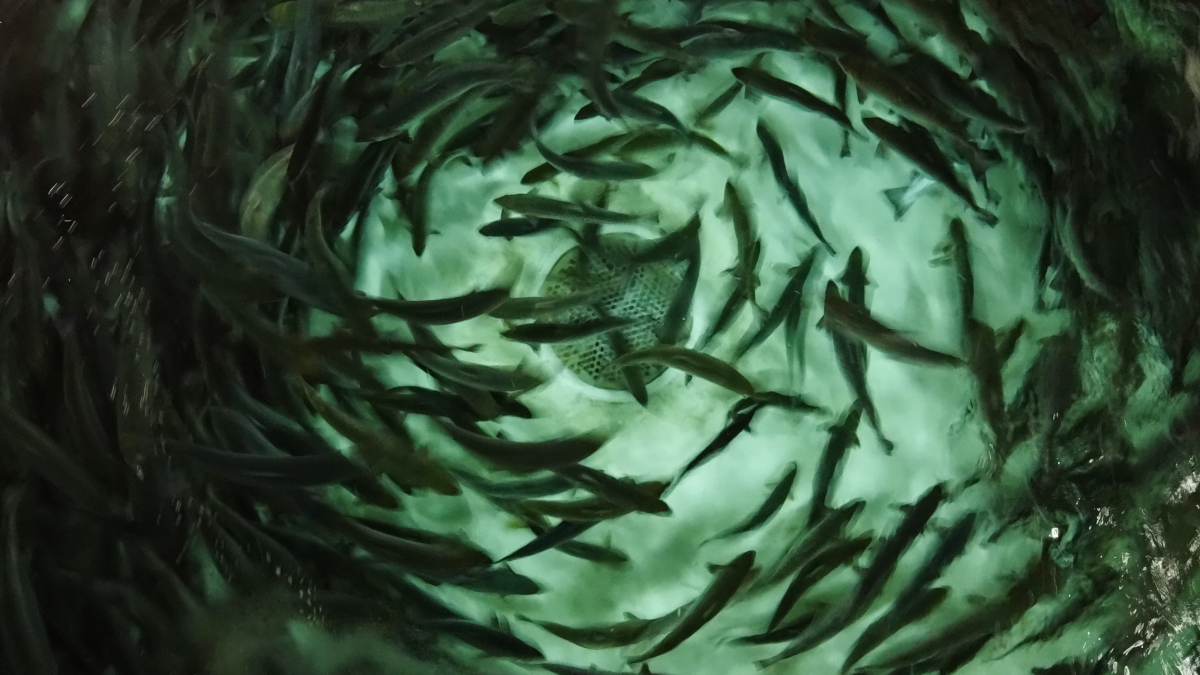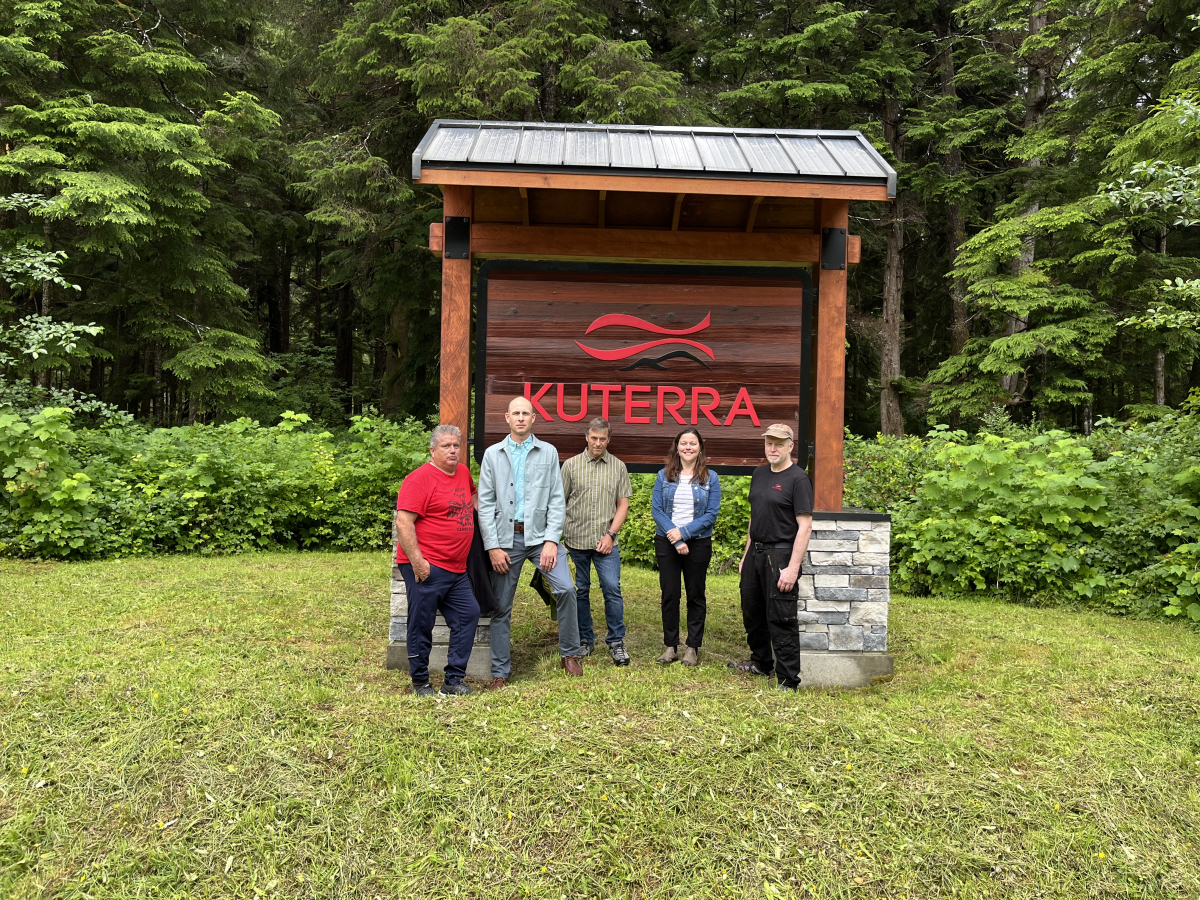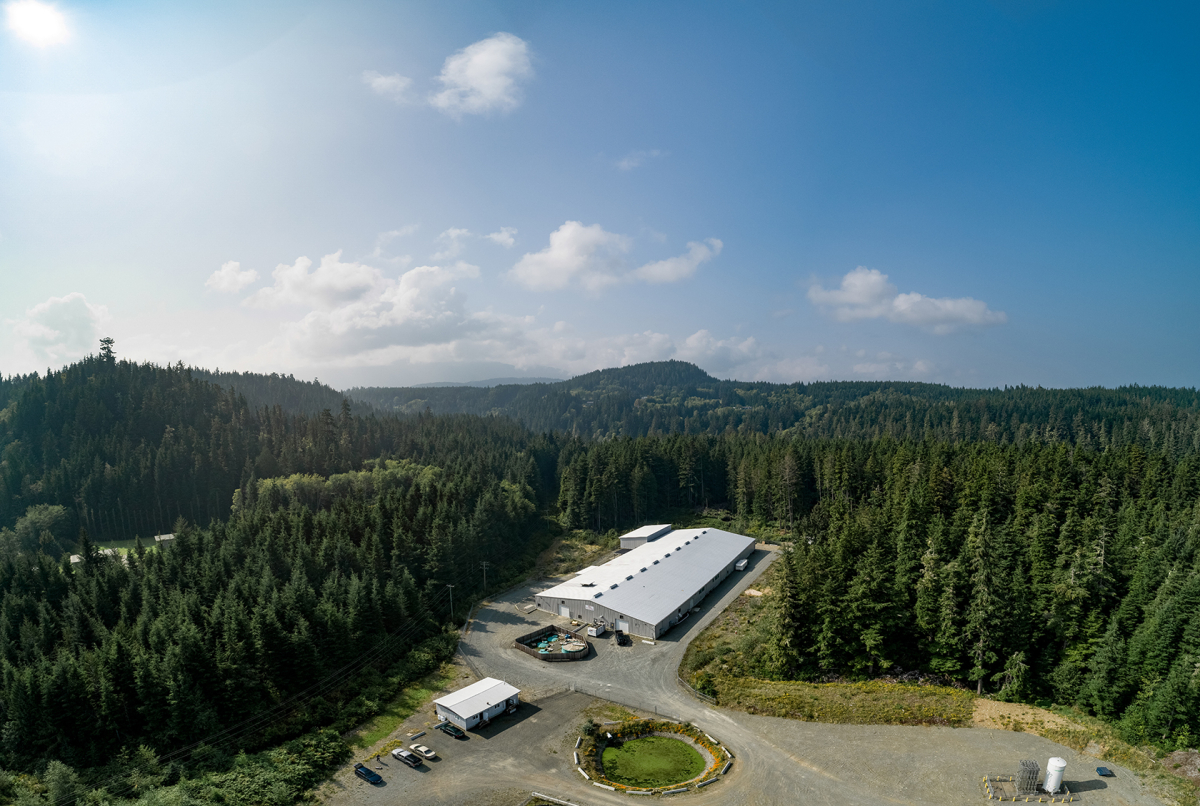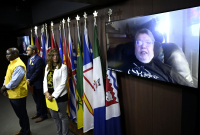Support strong Canadian climate journalism for 2025
As Canada transitions away from open net pen fish farming, raising fish in land-based tanks is being explored as a possible replacement to fill the gap and help protect wild salmon. But the economic viability of expanding the industry in British Columbia faces financial and logistical challenges.
As one of the only land-based fish farms in the country, Kuterra began as an Atlantic salmon farm but last year switched to steelhead trout. It operates on land leased by the 'Namgis First Nation near Port McNeill on Vancouver Island. The company farmed Atlantic salmon up until last year, when it was forced to change to steelhead after a breakdown with their supplier.
Land-based fish farming has struggled to get off the ground in B.C. — despite 120 First Nations being in support of a transition from open net pen farming to land-based solutions, and time running out for open net pen farms to operate on the West Coast. Industry hurdles like secure supply of hatchlings, a future-proof feed supply and regulatory challenges for new entries to the market, have limited the prospect of a thriving land-based farming industry in B.C.
Kuterra’s site has a small office building next to the farm, which holds a quarantine tank for the new fish coming in; but the six larger growing tanks are the main attraction on a recent tour of the facility granted to Canada’s National Observer.
The facility is surrounded by wildflowers and subtly encroaching brush, as well as two basins in the front filled with water from their waste treatment process that goes back into the ground. The whole facility claims to have zero contact with the ocean, rivers or streams.
The company received $11 million in 2013 for its initial building costs, which came from a mix of government funding and philanthropic donations from many donors including Tides Canada. Since then, it has survived another 10 years without further assistance. The company, which farms steelhead salmon, began as a pilot project to prove fish farming can be successful outside of the oceans.
“Is it economical to grow fish in this manner? The answer is yes, but the path to get there, I think, might not look exactly like other traditional or commercial agriculture businesses,” says Cody Smith, general manager of Kuterra.

The federal government has moved to transition away from open net pen farming by 2029. The farms, located in sheltered stretches of ocean, are criticized as being hot beds for disease and parasites that can be transferred to wild fish that migrate past.
Land-based fish farming offers an alternative, as disease is far less of an issue on a land-based farm because of how the facility is structured, says production manager John Burton. Land-based farmed fish never interact with the wild, and fish come directly to the facility from the hatchery clean and start their life at Kuterra in a quarantine tank, where any fish that might have a health problem are quickly removed.
Inside, a feeding pipe spins around over one of the tanks, depositing pellets into the water below, and 38,000 little steelhead salmon jump up to the surface to grab their meal. Just last year, tanks at the Kuterra facility were full of Atlantic salmon.
Supply of smolt, the young fish in the early stages of development, became an issue for Kuterra last year after their supplier ended their contract suddenly, leaving Kuterra to find a new supplier and make the transition to steelhead salmon.
“To be perfectly frank, they were really doing us a favor by selling the smolt. They didn't have to sell us smolt. We were more of a nuisance than any benefit to them. At some point, they just decided I guess it wasn't worth their effort… It wasn't anything nefarious,” Burton said.

The shutoff left them in a lurch, but Smith says they were able to quickly transition to steelhead. The company was producing 5,000 to 6,000 tonnes per week of the more marketable Atlantic salmon before the supplier breakdown. Now they are down to 4,000 tonnes of steelhead per week. At Save On Foods, a B.C.-based grocery chain, farmed Atlantic salmon can sell for $33.68 for the average filet, while a steelhead filet on average goes for $19.93.
However, there may be an upside. The team has noticed a more predictable survival rate of the steelhead compared to the Atlantic salmon, and are working to once again build up the numbers.
Feed supply will also become a challenge for land-based farms. Right now, Kuterra uses the same suppliers selling food to open net pen farms. Once the ocean-based farms are gone, suppliers will not stay in B.C. unless the land-based farms industry increases in number, says Gary Robinson, Kuterra consultant and former director of West Coast operations.
If feed suppliers leave the province, and Kuterra is forced to order feed from eastern Canada or the US, Robinson says it would add significant trucking costs.
On the East Coast, the only other land-based salmon producer in the country, Sustainable Blue, is in the final stages of transitioning to its own feed supply made from insects and other proteins with the intent to sell it to other commercial fish farms, a potential alternative feed source to the local mills in B.C.
Sustainable Blue has had its own set of challenges. Last November, a malfunction of equipment unique to the company resulted in the death of approximately 100,000 salmon, 20 per cent of its production.
Regulatory challenges also hinder the growth of the industry. Burton says policies like limiting groundwater access under the Water Use Act — something Kuterra was grandfathered into — don’t take into account the needs of land-based fish farms and will hinder the possibility for expansion in B.C., and off-puts potential companies coming in.
Robinson says after 10 years of operations, the company has ideas for how to help the industry grow. He has had various promises of support from the government over the years — support he says the industry needs in order to survive — but it hasn’t been fruitful.
He wants the industry to thrive here, but says it’s not guaranteed.
“It'd be nice to be here. But because of the situation in B.C., the costs of building and doing businesses in B.C., the regulatory uncertainty… I see a long term future for land-based [fish farming], but unfortunately, not here in B.C. unless something drastically changes,” Robinson said.






Comments
"Several recent surveys show that consumers will pay a premium for products that are sustainable and don’t harm the environment. Land-raised salmon may eventually upend the global market. For now, transparency, better regulation, and accurate labels on farmed salmon are essential to ensure good choices for our health and the health of our planet. Until that happens, farmed Atlantic salmon from open-net pens is off our menu and should be off yours"....BY DOUGLAS FRANTZ AND CATHERINE COLLINS
If you can't make land based fish farming profitable I suggest you find another occupation besides this destructive, antibiotic, dyed, Frankenstein fish industry that uses up fish meal and fish oil from anchovies, sardines, mackerel, herring, and other small forage fish which comprise 25 to 30 percent of most salmon feed and destroys our wild pacific salmon runs with their parasites and disease.